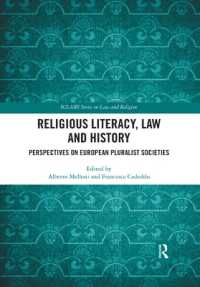- ホーム
- > 洋書
- > 英文書
- > History / World
Full Description
A revealing look at the changing role of churches in the decades after the American Revolution.
Most Americans today would not think of their local church as a site for arbitration and would probably be hesitant to bring their property disputes, moral failings, or personal squabbles to their kin and neighbors for judgment. But from the Revolutionary Era through the mid-nineteenth century, many Protestants imbued local churches with immense authority. Through their ritual practice of discipline, churches insisted that brethren refrain from suing each other before "infidels" at local courts and claimed jurisdiction over a range of disputes: not only moral issues such as swearing, drunkenness, and adultery but also matters more typically considered to be under the purview of common law and courts of equity, including disputes over trespass, land, probate, slave warranty, and theft.
In Law in American Meetinghouses, Jeffrey Thomas Perry explores the ways that ordinary Americans—Black and white, enslaved and free—understood and created law in their local communities, uncovering a vibrant marketplace of authority in which church meetinghouses played a central role in maintaining their neighborhoods' social peace. Churches were once prominent sites for the creation of local law and in this period were a primary arena in which civil and religious authority collided and shaped one another. When church discipline failed, the wronged parties often pushed back, and their responses highlight the various forces that ultimately hindered that venue's ability to effectively arbitrate disputes between members. Relying primarily on a deep reading of church records and civil case files, Perry examines how legal transformations, an expanding market economy, and religious controversy led churchgoers to reimagine their congregations' authority. By the 1830s, unable to resolve doctrinal quibbles within the fellowship, church factions turned to state courts to secure control over their meetinghouses, often demanding that judges wade into messy ecclesiastical disputes.
Tracking changes in disciplinary rigor in Kentucky Baptist churches from that state's frontier period through 1845, and looking beyond statutes and court decrees, Law in American Meetinghouses is a fresh take on church-state relations. Ultimately, it highlights an oft-forgotten way that Americans subtly repositioned religious institutions alongside state authority.
Contents
A Note on Sources
Introduction
Chapter 1. "The Want of Discipline": Baptist Churches and Local Law in Frontier Kentucky
Chapter 2. Churches' "Perplexing Difficulties": Race, Gender, and Household Relations
Chapter 3. A "Habitation of Justice?": The Market Revolution and the Search for Dispassionate Arbitration
Chapter 4. "The Putrid Carnage of Contention": Religious Insurgency and Church Authority
Chapter 5. "A Great Curse to the Neighborhood": Church Property Disputes and State Authority
Conclusion
Acknowledgments
Appendix
Notes
Index





